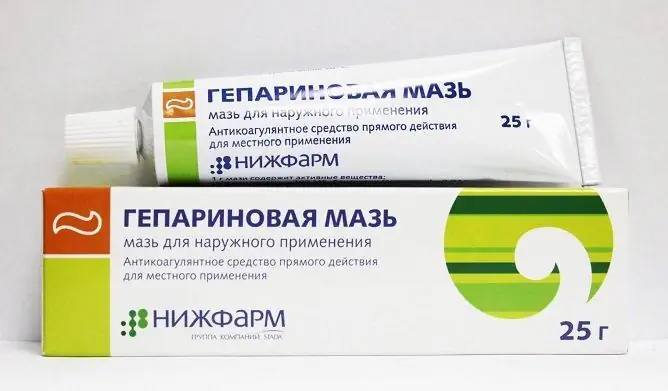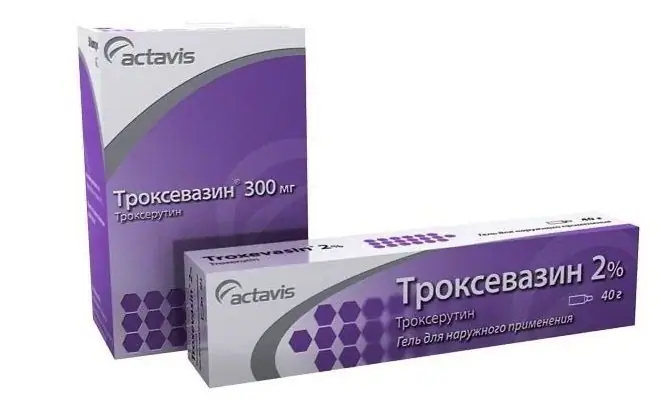- Author Rachel Wainwright [email protected].
- Public 2023-12-15 07:39.
- Last modified 2025-11-02 20:14.
Yodilife
Yodilife: instructions for use and reviews
- 1. Release form and composition
- 2. Pharmacological properties
- 3. Indications for use
- 4. Contraindications
- 5. Method of application and dosage
- 6. Side effects
- 7. Overdose
- 8. Special instructions
- 9. Application during pregnancy and lactation
- 10. Use in childhood
- 11. In case of impaired renal function
- 12. Drug interactions
- 13. Analogs
- 14. Terms and conditions of storage
- 15. Terms of dispensing from pharmacies
- 16. Reviews
- 17. Price in pharmacies
Latin name: Iodilife
ATX code: A11EC
Active ingredient: folic acid + potassium iodide + cyanocobalamin (Folic acid + Potassium iodide + Cyanocobalamin)
Manufacturer: Italfarmaco S.p. A. (Italfarmaco, SpA) (Italy)
Description and photo update: 2019-11-07
Prices in pharmacies: from 309 rubles.
Buy

Iodilife is a complex drug that replenishes the deficiency of vitamins (folic acid and cyanocobalamin) and iodine.
Release form and composition
The drug is available in the form of tablets: round, biconvex, from pale yellow to dark yellow, sometimes with darker blotches (28 pieces in blisters, one blister in a cardboard box and medical instructions for the use of Yodilife).
Composition for one tablet:
- active ingredients: folic acid - 0.4 mg; potassium iodide - 0.262 mg (corresponds to 0.2 mg of iodide); cyanocobalamin (crystalline vitamin B 12) - 0.002 mg;
- auxiliary components: microcrystalline cellulose, citric acid, lactose monohydrate, maltodextrin, calcium stearate, sodium carboxymethyl starch, sodium citrate.
Pharmacological properties
Pharmacodynamics
Folic acid is one of the B vitamins (also called vitamin B 9). In the body, it is reduced to tetrahydrofolic acid, which is involved in the metabolism of choline, the synthesis of pyrimidines and purines, and in general - in the metabolism of proteins and nucleic acids. Vitamin B 9 is essential for the formation of the central nervous system, which develops 15-28 days after the fertilization process. With a deficiency of folic acid, the fetus develops neural tube defects.
Vitamin B 12 (cyanocobalamin) exists inside cells in the form of active coenzymes: adenosinocobalamin and methylcobalamin. With the participation of methylcobalamin, the correct work of the enzyme methionine synthetase, which catalyzes the metabolism of folic acid, is carried out. This interaction of cobalamin and folic acid is necessary for the normal synthesis of adenine, guanine, cytosine, thymine and uracil, and therefore deoxyribonucleic acid (DNA). With a lack of folic acid or vitamin B 12, the synthesis of 8-adenosylmethionine and methionine decreases, as a result of which the synthesis of polyamines and proteins, as well as many methylation reactions, is disrupted.
The RDA for vitamin B 12 is 2 mcg. When planning pregnancy and in the first trimester, healthy women need to additionally take folic acid at a dose of 400 mcg per day.
Iodine is the main element necessary for the synthesis of triiodothyronine (T 3) and thyroxine (T 4). The mass fraction of iodine in these hormones is 59 and 65%, respectively. Thyroid hormones play an important role in the functioning of the central nervous system at all stages of life.
Pharmacokinetics
Vitamin B 9 is rapidly absorbed in the jejunum and then reduced and methylated to 5-methyltetrahydrofolate. The maximum plasma concentration is observed in 0.5-1 hour. Folic acid actively binds to plasma proteins. It passes through the placental and blood-brain barriers, and is also secreted in breast milk. It is excreted by the kidneys mainly in the form of metabolites.
Cyanocobalamin is absorbed after interacting with Castle's factor, a glycoprotein secreted by the parietal cells of the stomach. In blood plasma, the maximum concentration of cyanocobalamin is reached after 8-12 hours. It binds to a large extent with plasma proteins; excess vitamin B 12 accumulates in the liver. Like folic acid, cyanocobalamin undergoes enterohepatic recirculation. The average T 1/2 is approximately 6 days. A small amount of vitamin B 12 is excreted through the kidneys in the first 8 hours, most of it is excreted in the bile. About 25% of the substance is excreted through the intestines. Cyanocobalamin crosses the placental barrier and is found in breast milk.
Iodine is well absorbed. It is generally accepted that the coefficient of its intestinal absorption after taking water-soluble iodine salts (for example, potassium iodide) is 100%. The exact mechanism of intestinal absorption of iodine is unknown. After absorption, iodine is rapidly distributed throughout the intercellular fluid. It crosses the placental barrier and enters breast milk; transported to the intestinal mucosa, salivary glands and other tissues of the body (except for the tissues of the thyroid gland). Most of the iodine is excreted through the kidneys, a small amount - with bile, sweat, saliva, breast milk and through the intestines.
Indications for use
Iodilife is used in women of reproductive age when planning pregnancy in order to prevent deficiency of folic acid, cyanocobalamin and iodine (the intake should be started at least 1 month before the planned conception).
In addition, during pregnancy, Yodilife is prescribed in the first trimester to prevent the occurrence of neural tube defects in a developing fetus.
Contraindications
Absolute:
- latent or severe hyperthyroidism, acute bronchitis (with a daily dose of potassium iodide of more than 150 mg);
- malabsorption of galactose or glucose, lactase deficiency, hereditary galactose intolerance;
- age up to 18 years;
- breast-feeding;
- hypersensitivity to the components in the composition of Yodilife.
Relative (the drug is used with caution):
- autoimmune thyroiditis;
- goiter;
- hypocomplementary urticarial vasculitis;
- chronic hyperkalemia;
- active form of tuberculosis;
- kidney disease;
- epilepsy.
Yodilife, instructions for use: method and dosage
Yodilife tablets are taken orally, before meals, 1 pc. per day.
The duration of the course for the purpose of prevention is at least 1 month at the stage of pregnancy planning and throughout the entire first trimester with the onset of pregnancy. Repeated courses are possible upon doctor's prescription.
Side effects
- digestive system: nausea, metallic taste in the mouth, vomiting, increased salivation, abdominal pain, bloating, diarrhea, flatulence;
- cardiovascular system: periarthritis (sometimes fatal), vasculitis;
- lymphatic system and blood: thrombocytopenic purpura;
- endocrine system: hypo- or hyperthyroidism, goiter;
- immune system: dropsy (including swelling of the glottis and face);
- skin: urticaria, pruritus, erythema, exanthema, skin rash, Quincke's edema;
- other reactions: general malaise, hypersensitivity, symptoms similar to serum sickness (joint pain, eosinophilia, fever, formation of lymphatic cysts).
Overdose
Overdose symptoms of Yodilife are similar to the side effects of the drug. The patient has a metallic taste in the mouth, salivation increases, teeth and gums become more sensitive, sneezing, irritation of the nasal mucosa, and swelling of the eyelids becomes noticeable (these symptoms are known as iodism). Also, the patient may experience disorders of the digestive system (diarrhea), headache, cough, inflammation of the pharynx, tonsils and larynx may occur, the functions of the submandibular and parotid glands may be impaired, pulmonary edema is sometimes observed, as well as moderate rashes on the seborrheic areas of the skin.
If signs of an overdose appear, you should stop taking Yodilife and seek medical help. Treatment is usually symptomatic.
special instructions
Antibiotics can underestimate serum folate and erythrocyte folate levels.
Iodine-containing drugs affect the function of the thyroid gland, so taking them can distort the results of studies of this gland.
When you skip the next dose of Jodilife, you should not double the dose and take two tablets instead of one.
Influence on the ability to drive vehicles and complex mechanisms
The components in Jodilife do not affect the patient's ability to drive cars and other vehicles and perform work that requires a quick response and special attention (the work of an operator, dispatcher, work with moving mechanisms, etc.).
Application during pregnancy and lactation
During pregnancy, Yodilife is used according to indications.
During the period of breastfeeding, taking Yodilife is not recommended, since to date there are no data on its use during breastfeeding.
Pediatric use
Yodilife is contraindicated in children and adolescents under the age of 18.
With impaired renal function
In patients with kidney disease, the drug is used with caution.
Drug interactions
Iodilife is not recommended to be taken together with pyrimethamine, trimethoprim, methotrexate and triamterene, since the listed substances inhibit tetrahydrofolate reductase, being folic acid antagonists.
The drug can reduce the effectiveness of antiepileptic drugs from the hydantoin group (for example, phenytoin).
Oral contraceptives, estrogens and analgesics (with long-term treatment) increase the body's need for folic acid.
The absorption of folic acid is reduced in the case of simultaneous use with cholestyramine, antacids and sulfonamides. Potassium-sparing diuretics may decrease renal potassium elimination, resulting in an increased risk of severe chronic hyperkalemia.
Co-administration with potassium and lithium salts, as well as antithyroid drugs can lead to the development of hypothyroidism.
Analogs
The analogues of Yodilife are: Combilipen, Combilipen Tabs, Compligam B, Trigamma, Vitaxon, Binavit, Askofol, Angiovit, Potassium iodide, Potassium iodide Renewal, Gino-Tardiferon, Aktiferrin Compositum, Iodbalans, Vitrum Iodine for children and Iodine.
Terms and conditions of storage
Store out of the reach of children at a temperature not exceeding 25 ° C.
The shelf life of the tablets is 3 years.
Terms of dispensing from pharmacies
Dispensed by prescription.
Reviews about Yodilife
In general, the reviews about Yodilife are positive. Users note that the drug is good, but there are no special differences with ordinary folic acid and potassium iodide. One tablet combines three useful components, that is, instead of three tablets per day, it is enough to take only one. Iodilife does not cause drowsiness, and pregnant women note that due to taking pills, signs of toxicosis appear less often.
According to patients, the main disadvantage is the high cost compared to some similar drugs.
Price for Yodilife in pharmacies
The price of Yodilife (in a package of 28 pcs.) Varies from 310 to 480 rubles.
Yodilife: prices in online pharmacies
|
Drug name Price Pharmacy |
|
Yodilife tablets 28 pcs. 309 RUB Buy |

Anna Kozlova Medical journalist About the author
Education: Rostov State Medical University, specialty "General Medicine".
Information about the drug is generalized, provided for informational purposes only and does not replace the official instructions. Self-medication is hazardous to health!






